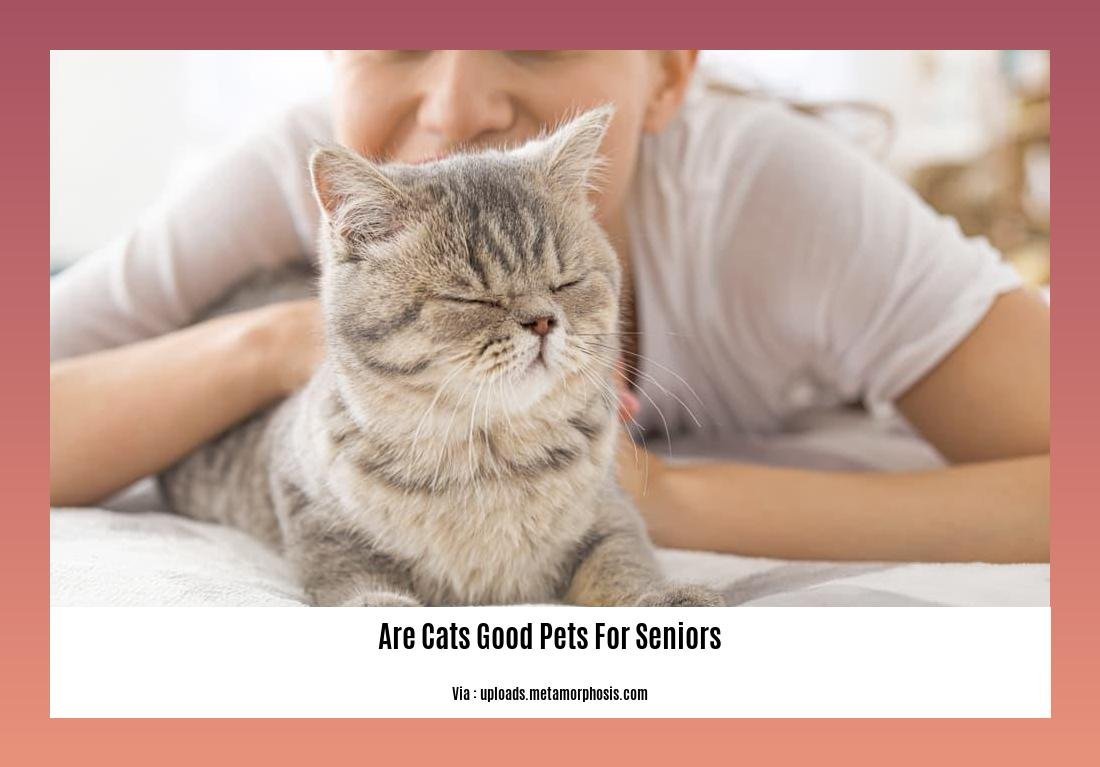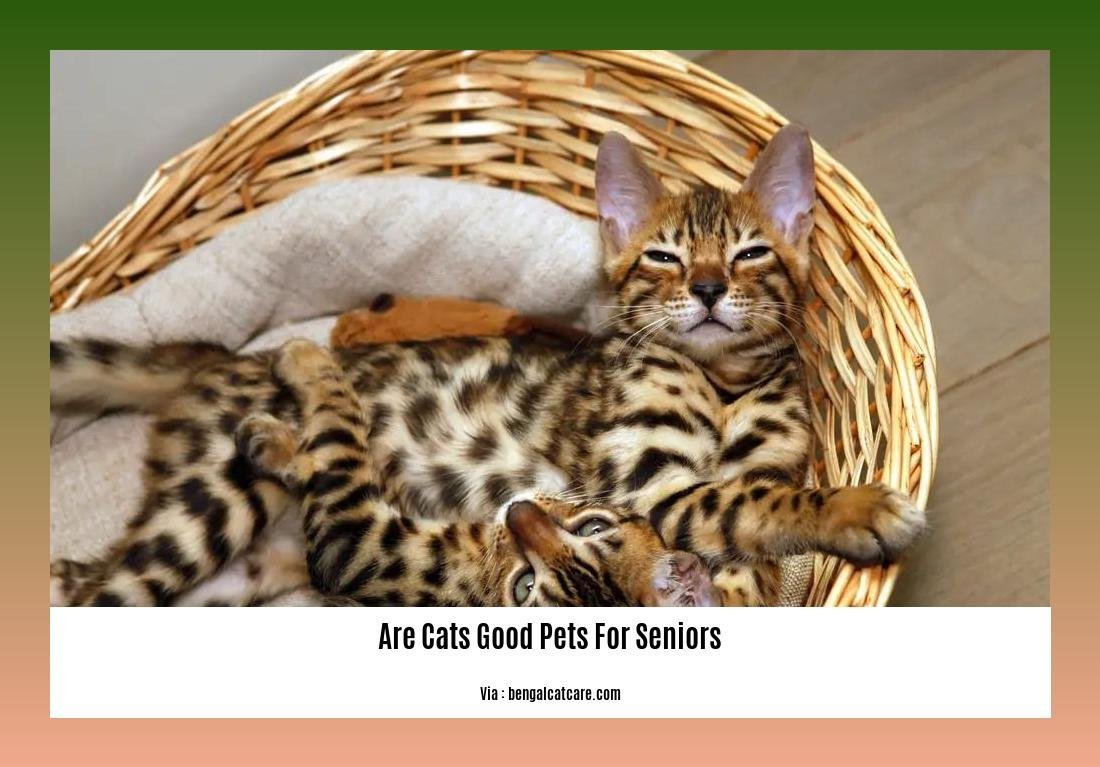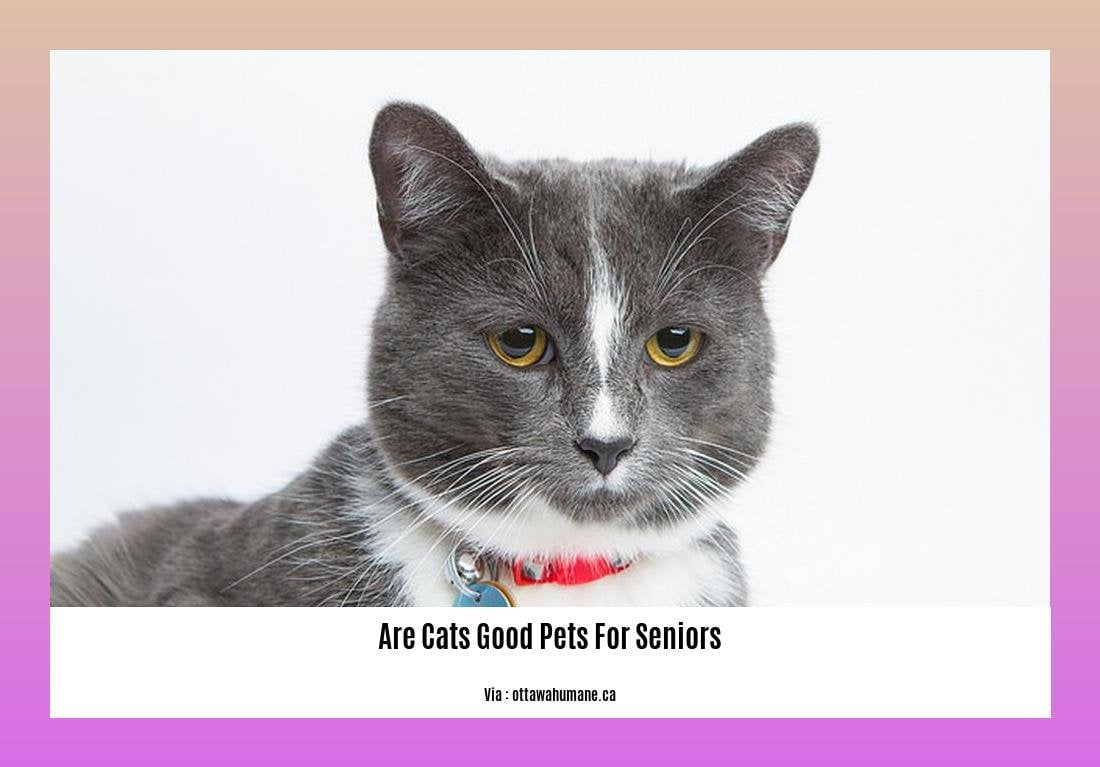Are cats good pets for seniors? Exploring the benefits of feline companionship for older adults.
As people age, many find solace and joy in the company of pets. For seniors, having a furry friend can be especially fulfilling and rewarding. In recent years, studies have shown that cats make excellent companions for older adults, providing a range of benefits that contribute to their overall well-being. From improved mental and physical health to increased social interaction, feline companionship has been proven to enhance the quality of life for seniors. In this article, we will delve into the advantages of having cats as pets for older adults, highlighting the positive impact they can have on their daily lives. So, let’s explore the wonderful world of cats and the benefits they bring to seniors.
Key Takeaways:
- Cats are low maintenance pets, making them suitable for seniors who may not have the time or energy for a high-maintenance pet.
- Bonding with a cat can lower blood pressure and cholesterol levels, contributing to better overall health for senior owners.
- Cats are excellent companions for individuals of all ages, including busy professionals, families, and seniors.
- Cats require less exercise and maintenance compared to dogs, making them ideal companions for the elderly.
- Having a cat can provide seniors with companionship, love, and emotional support.
- Cats encourage physical activity through petting and feeding, which helps keep joints flexible and benefits the cardiovascular system.
- Birman cats are considered ideal for seniors due to their low-maintenance nature and love for companionship.
Are Cats Good Pets for Seniors? Exploring the Benefits of Feline Companionship for Older Adults

As we age, it becomes even more important to prioritize our physical and mental well-being. One way to enhance our overall quality of life is by introducing a furry friend into our lives. Cats, in particular, can be excellent companions for seniors, offering a multitude of advantages that can greatly improve their daily lives. So, are cats good pets for seniors? Let’s explore the benefits of feline companionship for older adults.
The Advantages of Owning a Cat as a Senior
1. Companionship and Emotional Support
As we enter our golden years, it’s not uncommon to experience feelings of loneliness or isolation. This is where a cat can truly make a difference. Cats are known for their independent yet affectionate nature, offering companionship and emotional support to seniors. The joyful purring, gentle nuzzles, and warm presence of a cat can help combat feelings of loneliness and provide a sense of purpose for seniors.
2. Improved Mental Well-being
Caring for a cat can have a remarkable impact on a senior’s mental well-being. The responsibility and routine that come with owning a cat can provide a sense of structure and purpose, which is particularly beneficial for those who may no longer be working or have regular commitments. Having a furry friend to take care of can also help alleviate symptoms of depression, anxiety, and stress, providing a daily dose of happiness and comfort.
3. Physical Health Benefits
Contrary to popular belief, cats can actually contribute to improved physical health for seniors. Studies have shown that interacting with cats can lower blood pressure and cholesterol levels, reducing the risk of heart disease and stroke. Additionally, the act of petting and playing with a cat can help keep joints flexible and benefit the cardiovascular system. Cats also encourage movement and increased activity levels, which is particularly important for seniors who may have a more sedentary lifestyle.
4. Low Maintenance
One of the many advantages of owning a cat as a senior is their low-maintenance nature. Cats are known for their ability to groom themselves, reducing the need for frequent baths and grooming sessions. They also require less exercise compared to dogs, making them suitable companions for seniors who may have limited mobility or energy. With cats, seniors can enjoy all the benefits of pet ownership without feeling overwhelmed by excessive care or maintenance.
5. Allergies and Medication Issues
For seniors with allergies or concerns about medication issues, cats can be a great pet choice. Cats tend to produce fewer allergens compared to dogs, making them a more suitable option for individuals with allergies. Additionally, cats generally require fewer medications, reducing the potential complications and challenges that can arise with managing multiple medications.
Choosing the Right Cat for a Senior
When considering owning a cat as a senior, it’s important to choose the right breed that aligns with your lifestyle and preferences. While all cats can provide companionship and love, certain breeds may be better suited for senior owners. Birman cats, for example, are considered “ideal” for seniors due to their low-maintenance nature and love for companionship. However, it’s essential to understand that individual cat personalities can vary, so it’s crucial to spend time with potential furry friends before making a decision.
Conclusion
In conclusion, cats can be exceptional pets for seniors, offering numerous benefits that enhance their overall well-being. The companionship, emotional support, improved mental well-being, and physical health benefits of owning a cat as a senior are truly remarkable. With their low-maintenance nature and reduced medication issues, cats provide a perfect balance between companionship and independent living. So, if you’re a senior considering welcoming a furry friend into your life, rest assured that cats can bring joy, love, and a bundle of positive benefits to brighten your days.
Are you considering getting a cat for your apartment? Find out if cats are good for apartments here.
Do you want to know if cats are safer than dogs? Discover the answer here.
Planning a trip to Death Valley National Park with your furry friend? Check if dogs are allowed in the park here.
Interaction with a Cat Can Help Reduce Stress and Anxiety in Seniors

Cats are more than just adorable companions; they can play a significant role in improving the mental well-being of seniors. Interacting with a cat can provide a sense of comfort, reduce stress levels, and alleviate feelings of anxiety. Let’s explore how the interaction with a cat can help reduce stress and anxiety in seniors.
Research has shown that owning a cat can have a positive impact on mental health. According to a survey conducted by the Human Animal Bond Research Institute (HABRI), 76% of pet owners reported that their personal health improved as a result of having a pet. Cats, in particular, are known for their ability to offer emotional support and therapy to individuals dealing with depression, stress, anxiety, and other mental health issues.
Loneliness is a growing concern among seniors, with many individuals living alone and having smaller circles of friends. This isolation can contribute to increased anxiety and other mental health challenges. However, owning a cat can help combat loneliness and provide a sense of companionship. The presence of a cat offers a comforting and nonjudgmental presence, making a significant difference in the lives of seniors.
But what is it about cats that make them so effective at reducing stress and anxiety? Well, there is a scientific theory behind our affinity for cats. Beyond their soothing presence, cats have the ability to offer socialization and stress relief. Studies have found that just 10 minutes of petting or cuddling with a cat can relieve stress and improve moods. Cats, with their cute and adorable nature, can bring a sense of joy and love, providing a much-needed emotional boost.
Cats can truly be a valuable addition to the lives of seniors. With their affectionate behavior and ability to provide companionship, they can have a significant positive impact on mental well-being. The interaction with a cat can provide a sense of purpose, structure, and alleviate symptoms of depression, anxiety, and stress.
Key Takeaways:
- Cats offer emotional support and therapy to seniors dealing with depression, stress, anxiety, and other mental health issues.
- Loneliness among seniors can be combated by the companionship of a cat and their comforting presence.
- Interacting with a cat through petting and cuddling can relieve stress and improve moods.
- Cats bring joy, love, and a bundle of positive benefits to brighten the days of seniors.
Sources:
– Rover.com: How Cats Can Help With Depression, Stress, Anxiety, and Mental Health
– Elite Daily: Does Having A Cat Reduce Stress? Science Says A
Owning a Cat Promotes Increased Physical Activity for Seniors
Owning a cat as a senior can have numerous benefits, and one significant advantage is the promotion of increased physical activity. Contrary to popular belief, cats are not lazy animals that spend all day sleeping. They are natural explorers and hunters, and their playful nature can encourage seniors to engage in more physical activities.
Caring for a cat requires regular feeding, grooming, and playtime, which can all contribute to physical activity. The simple act of filling the cat’s food bowl or cleaning their litter box involves movement and can help seniors stay active. Additionally, playtime with a cat, such as using toys or interacting with them using a laser pointer, can provide a fun and engaging way for seniors to incorporate physical activity into their daily routine.
Engaging in playtime with a cat can also provide exercise for seniors. Whether it’s tossing a ball for the cat to chase or using a cat wand toy for interactive play, these activities can stimulate the cat’s natural instincts while also getting seniors moving. Playing with a cat can involve stretching, bending, and reaching, which can help improve flexibility and coordination.
It’s important to note that the level of activity will vary depending on the cat’s age and temperament. Seniors are generally advised to adopt senior cats instead of kittens due to the challenges of caring for energetic kittens. Senior cats tend to be more relaxed and require less exercise, making them a more suitable companion for seniors.
While the physical activity associated with owning a cat may not be as intense as other forms of exercise, it still provides valuable benefits for seniors. Regular movement and engagement with a cat can help improve mobility, prevent stiffness, and reduce the risk of certain health conditions associated with a sedentary lifestyle.
Owning a cat can also provide a sense of purpose and motivation for seniors to stay active. The responsibility of caring for a pet encourages seniors to maintain a consistent routine and engage in daily activities. The companionship and bond formed with a cat can be a powerful motivator to prioritize physical activity.
In summary, owning a cat promotes increased physical activity for seniors. Caring for a cat involves regular movement and playtime, which can help seniors stay active and improve mobility. The companionship and bond formed with a cat can provide a sense of purpose and motivation to prioritize physical activity. So, if you’re a senior looking for a furry companion that encourages you to stay active, owning a cat may be the perfect choice for you.
Key Takeaways:
- Cats can promote increased physical activity for seniors through daily care routines and playtime.
- Regular movement and engagement with a cat can improve mobility and prevent a sedentary lifestyle.
- Owning a cat provides a sense of purpose and motivation for seniors to stay active.
- Adopting a senior cat is recommended for seniors due to their lower energy levels and exercise requirements.
Sources:
– Rover.com: How Cats Can Help With Depression, Stress, Anxiety, and Mental Health
– Elite Daily: Does Having A Cat Reduce Stress? Science Says A
Considerations and Precautions for Seniors Owning Cats
Key Takeaways:
- Older cats require special accommodations such as softer bedding and easy access to litter boxes.
- Senior cats sleep more and need a quiet and comfortable space for undisturbed rest.
- It’s important to provide senior cats with their own space where they can feel safe and relax.
- Allow senior cats time to adjust to their new home and establish a routine.
- Find a veterinarian experienced with senior cats for regular check-ups and age-appropriate care.
- Consult with a veterinarian to ensure that your senior cat receives the right diet and nutrition.
- Senior cats are at a higher risk of dehydration, so ensure they have access to fresh water at all times.
- Cats can make wonderful companions for seniors with proper care and attention.
When it comes to senior cats, there are several considerations and precautions that seniors should be aware of before bringing one into their home. These important points can help ensure a smooth transition and provide the best possible care for their feline companion.
One crucial consideration is the special accommodations that older cats may require. As cats age, they are more likely to suffer from health issues such as arthritis. Providing softer bedding and easy access to litter boxes can help alleviate discomfort and make their daily routine easier.
Another factor to keep in mind is the sleep patterns of senior cats. As cats grow older, they tend to sleep more. It’s important to provide them with a quiet and comfortable space where they can rest undisturbed, ensuring they get the rest they need.
Senior cats may also prefer having their own space where they can retreat and feel safe. Providing hiding spots or a designated area where they can relax without being disturbed can help them feel secure in their new environment.
Adjustment time is essential for any cat, but particularly for senior cats. Moving to a new home can be stressful for them, so it’s important to give them time to adjust to their new surroundings and establish a routine. Patience and understanding during this period can make the transition smoother for both the cat and the senior owner.
Finding the right veterinarian with experience in caring for senior cats is essential. Regular check-ups and age-appropriate vaccinations are crucial for the well-being of senior cats. It’s important to establish a good relationship with a veterinarian who understands the specific needs of senior cats.
Diet and nutrition are other considerations for senior cats. Older cats may have specific dietary requirements, so consulting with a veterinarian can ensure that they receive appropriate nutrition. Adequate hydration is also important for senior cats, as they are at a higher risk of dehydration. Providing access to fresh water at all times and considering wet food to increase their water intake can help keep senior cats hydrated.
With proper care and attention, senior cats can make wonderful companions for seniors. Taking into account these considerations and precautions can help ensure a happy and healthy life for both the cat and the senior owner.
Sources:
- Catster: Adopting a Senior Cat? 10 Important Things You Need to Know!
- Senior Safety Advice: Are Cats Good Pets For Seniors?
FAQ
Q1: Are cats good pets for seniors?
A1: Yes, cats make great pets for seniors. They are low-maintenance and require less exercise and maintenance compared to dogs, making them suitable companions for older adults.
Q2: What are the benefits of owning a cat as a senior?
A2: Owning a cat as a senior has several benefits. Cats provide companionship, improve mental and physical well-being, and reduce feelings of loneliness and depression. They can also help lower blood pressure and cholesterol levels, promoting better overall health.
Q3: Are there certain cat breeds that are more suitable for senior owners?
A3: Yes, there are cat breeds that are considered more suitable for senior owners. One example is the Birman cat, which is low-maintenance and loves companionship. It’s important to consider a cat’s temperament and energy level when choosing a breed for a senior.
Q4: What are the cons of owning a cat for seniors?
A4: While owning a cat can have many benefits for seniors, there are some cons to consider. Challenges with aging pets or owners, the cost and administration of medication, tripping or injury hazards, and potential allergies are some of the cons to be aware of.
Q5: What if a senior is concerned about their own health or caring for the cat in the future?
A5: Some seniors may hesitate to adopt a pet due to concerns about their own health or what would happen to the pet if they could no longer care for it. In such cases, it’s important to have a plan in place, such as arranging for a friend or family member to care for the cat if needed, or considering fostering or adopting a senior cat from a shelter that provides support.
- China II Review: Delicious Food & Speedy Service - April 17, 2025
- Understand Virginia’s Flag: History & Debate - April 17, 2025
- Explore Long Island’s Map: Unique Regions & Insights - April 17, 2025
















